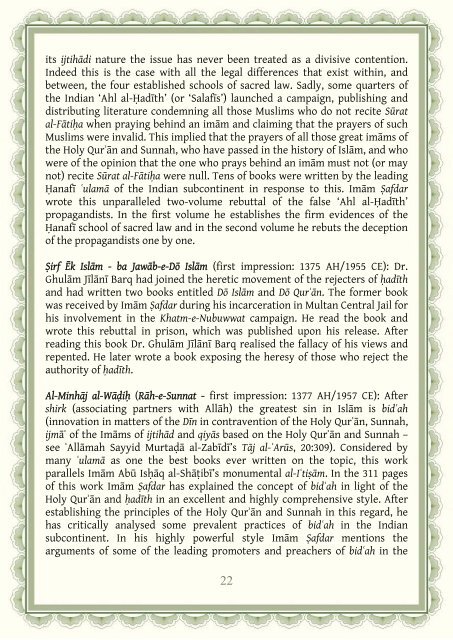Create successful ePaper yourself
Turn your PDF publications into a flip-book with our unique Google optimized e-Paper software.
its ijtihādi nature the issue has never been treated as a divisive contention.<br />
Indeed this is the case with all the legal differences that exist within, and<br />
between, the four established schools of sacred law. Sadly, some quarters of<br />
the Indian ‘Ahl al-Ḥadīth’ (or ‘Salafīs’) launched a campaign, publishing and<br />
distributing literature condemning all those Muslims who do not recite Sūrat<br />
al-Fātiḥa when praying behind an imām and claiming that the prayers of such<br />
Muslims were invalid. This implied that the prayers of all those great imāms of<br />
the Holy Qurʾān and Sunnah, who have passed in the history of Islām, and who<br />
were of the opinion that the one who prays behind an imām must not (or may<br />
not) recite Sūrat al-Fātiḥa were null. Tens of books were written by the leading<br />
Ḥanafī ʿulamā of the Indian subcontinent in response to this. Imām Ṣafdar<br />
wrote this unparalleled two-volume rebuttal of the false ‘Ahl al-Ḥadīth’<br />
propagandists. In the first volume he establishes the firm evidences of the<br />
Ḥanafī school of sacred law and in the second volume he rebuts the deception<br />
of the propagandists one by one.<br />
Ṣirf Ēk Islām - ba Jawāb-e-Dō Islām (first impression: 1375 AH/1955 CE): Dr.<br />
Ghulām Jīlānī Barq had joined the heretic movement of the rejecters of ḥadīth<br />
and had written two books entitled Dō Islām and Dō Qurʾān. The former book<br />
was received by Imām Ṣafdar during his incarceration in Multan Central Jail for<br />
his involvement in the Khatm-e-Nubuwwat campaign. He read the book and<br />
wrote this rebuttal in prison, which was published upon his release. After<br />
reading this book Dr. Ghulām Jīlānī Barq realised the fallacy of his views and<br />
repented. He later wrote a book exposing the heresy of those who reject the<br />
authority of ḥadīth.<br />
Al-Minhāj al-Wāḍiḥ (Rāh-e-Sunnat - first impression: 1377 AH/1957 CE): After<br />
shirk (associating partners with Allāh) the greatest sin in Islām is bidʿah<br />
(innovation in matters of the Dīn in contravention of the Holy Qurʾān, Sunnah,<br />
ijmāʿ of the Imāms of ijtihād and qiyās based on the Holy Qurʾān and Sunnah –<br />
see ʿAllāmah Sayyid Murtaḍā al-Zabīdī’s Tāj al-ʿArūs, 20:309). Considered by<br />
many ʿulamā as one the best books ever written on the topic, this work<br />
parallels Imām Abū Isḥāq al-Shāṭibī’s monumental al-Iʿtiṣām. In the 311 pages<br />
of this work Imām Ṣafdar has explained the concept of bidʿah in light of the<br />
Holy Qurʾān and ḥadīth in an excellent and highly comprehensive style. After<br />
establishing the principles of the Holy Qurʾān and Sunnah in this regard, he<br />
has critically analysed some prevalent practices of bidʿah in the Indian<br />
subcontinent. In his highly powerful style Imām Ṣafdar mentions the<br />
arguments of some of the leading promoters and preachers of bidʿah in the<br />
22














